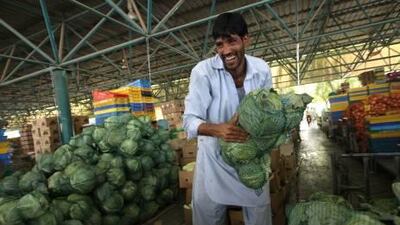DUBAI // On the first full day of Ramadan, the Ministry of Economy began its annual battle to stop shopkeepers using the holy month to lift prices.
Not that it is always easy to tell. At Dubai's fruit and vegetable market in Ras al Khor yesterday, most stalls did not have their prices properly displayed.
MORE ON RAMADAN
COMMENT: Ramadan could alter the course of Arab uprisings The holy month, and the extra prayer time and congregation that it brings, may re-energise the efforts of those seeking reforms. Read article
House of worship built on modesty Khalifa City mosque that sprang from an anonymous gift has become an important landmark to the broad range of people who pray there every day. Read article
Ramadan prayer times, August 1-7, 2011 Prayer times for Abu Dhabi during the expected first week of Ramadan. Read article
"The prices must be clear for the consumer," said Dr Hashim Al Nuaimi, the head of consumer protection at the ministry, as he toured the market.
"But today many stands did not display any prices. I warned them to and I requested the price to be clearly shown to the consumer because this is the law."
And some were higher than the prices approved by the ministry. At one stall, Dr Al Nuaimi pointed to a small box of peaches priced at Dh25.
"It's too much for Dubai," he shouted at the seller as he ripped off the price tag.
Most produce bore no clear price tags. At the next stall, a bunch of grapes appeared unpriced - an offence that can be "heavily fined", said Dr Al Nuaimi.
"There should always be a price and not after people take an interest in them, because they can tell them any price that comes to mind," he said.
Another stand sold a small bag of onions for Dh30 and a large one for Dh40. They should have been discounted for Ramadan, said Dr Al Nuaimi.
The neighbouring stall had a small box of grapes on sale for Dh45.
"This is definitely too expensive," said Dr Al Nuaimi.
It was also offering a large bag of onions for Dh50.
"At least make it Dh40 like your neighbour," Dr Al Nuaimi yelled at the seller. "It's the same quality so it should be priced the same."
Almost all of the kiosks triggered his anger. Some overcharged, while others bore no prices, or prices in English but not Arabic.
Only one stand met with his approval, pricing a lettuce at Dh5 and a bunch of parsley at Dh1.
"Generally, during Ramadan it should be 20 per cent less than the normal price," Dr Al Nuaimi said. "My main problem today was the lack of price tags."
He seemed unimpressed by 10 boxes of radishes: "They don't look fresh and they have no price."
The same went for the stall's mandarines, potatoes and onions: "Even 1 kilo of garlic is being sold for Dh50. It's too expensive. This is a free market, which means tomatoes should only go for Dh1 or Dh2. But when they price them Dh10 to Dh15 to make profit, it is illegal."
But he was content that prices were generally 20 per cent lower than last Ramadan. "And I hope they will remain low until the end of the month.
"Last year, 8kg of tomatoes were priced at Dh25. Today they were sold at Dh10 and Abu Dhabi had around the same prices."
But Obaid Ibrahim, the Dubai Municipality's head of the markets section, was not too pleased with the ministry's market visit.
"People from the ministry should visit the market every month to follow up," Mr Ibrahim said. "You can't monitor prices by visiting once a year."
He said the markets were far keener than those elsewhere, such as at the Emirates Co-operative Society and Carrefour.
"If you make a benchmark between us and them you will notice the difference," Mr Ibrahim said, adding that stocks were high this year. "And our prices are better than last year. We've had no complaints from our customers."
But he said prices might increase by five to 10 per cent in the last 10 days of Ramadan because "people will buy a lot of fruits for Eid".
"This is the only time traders can make profit, and they need it."
Customers who feel they have been overcharged should call the ministry's consumer protection hotline on 600 522225 between 7.30am and 2.30pm.

